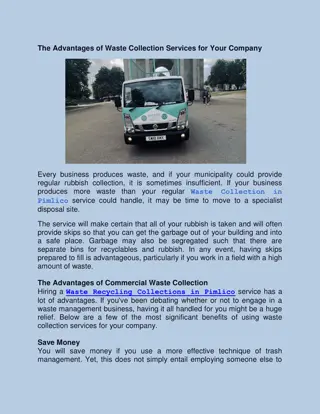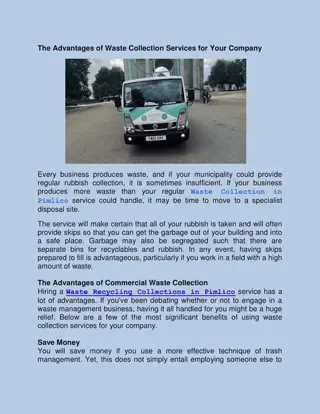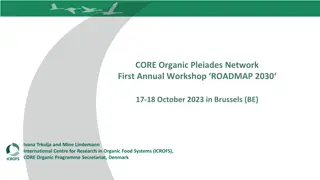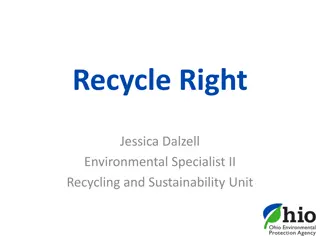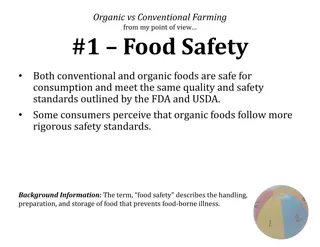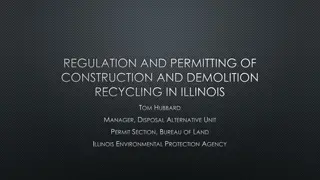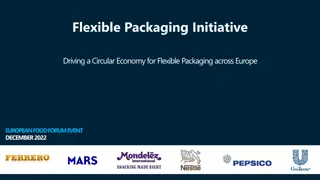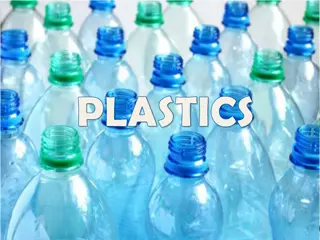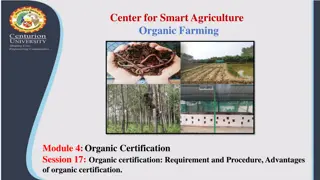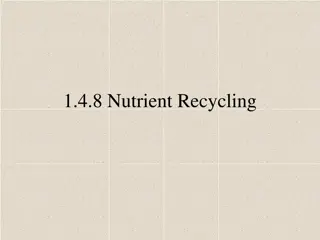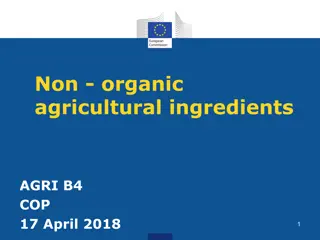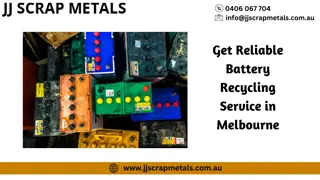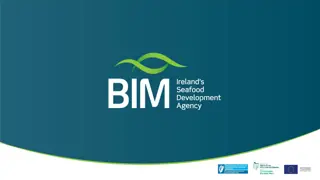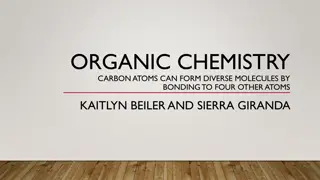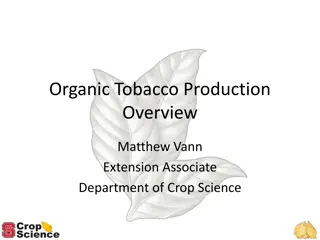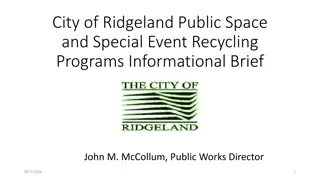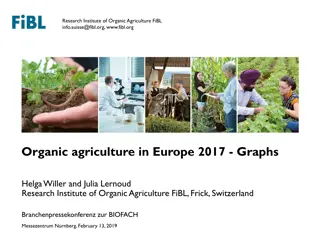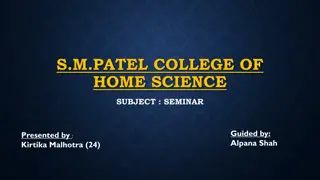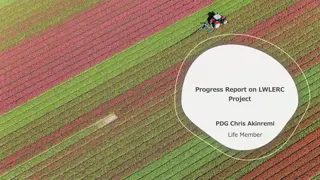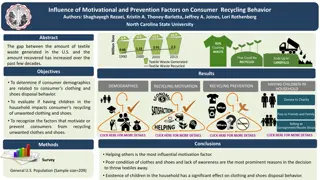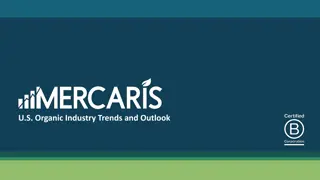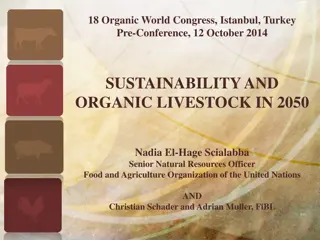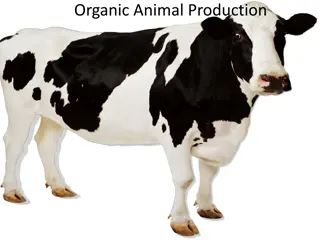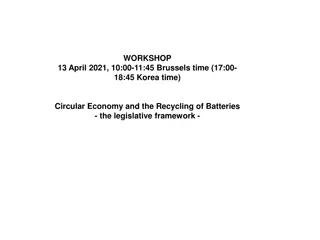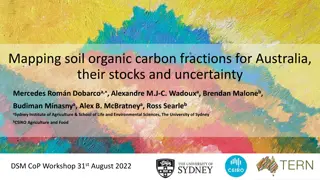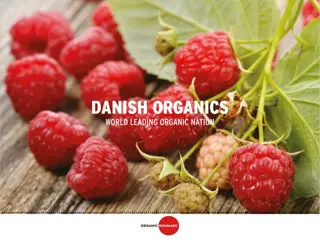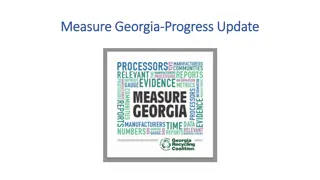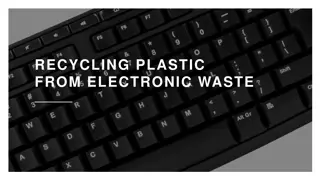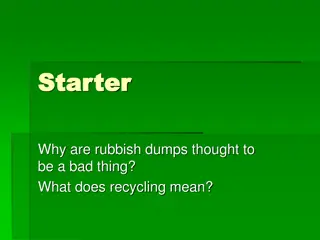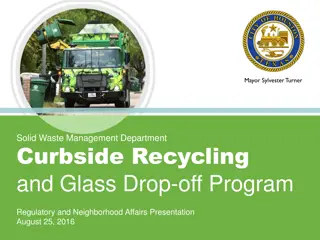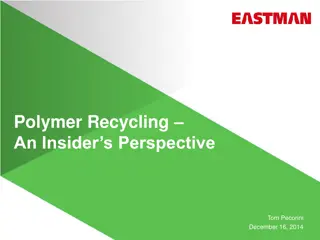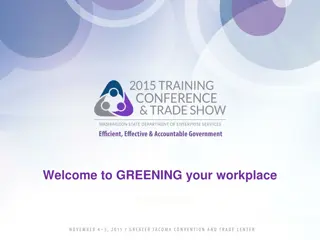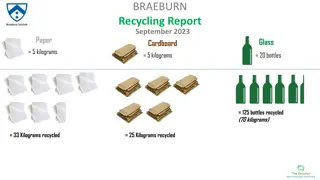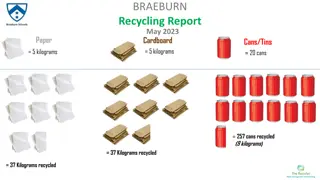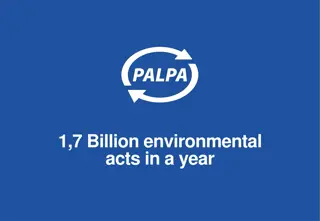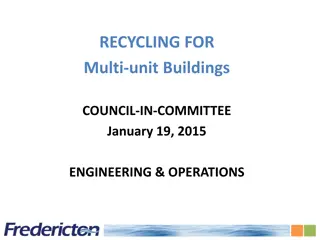Best Waste Recycling Collections in Pimlico
Are you looking for the best Waste Recycling Collections in Pimlico? Then visit Hart Waste and Recycling Services Ltd. Visit:-\/\/g.page\/hart-waste-and-recycling-service?share
0 views • 2 slides
Best Waste Recycling Collections in Pimlico
Are you looking for the best Waste Recycling Collections in Pimlico? Then visit Hart Waste and Recycling Services Ltd. Visit:-\/\/g.page\/hart-waste-and-recycling-service?share
0 views • 2 slides
Best Waste Services in Westminster
Looking for the Best Waste Services in Westminster, then visit Hart Waste and Recycling Services Ltd. They are a waste and recycling collection Service, they collect and dispose of waste and recycling at a convenient time of your choosing, 24 hours a day, & Seven days a week 365 days a year. They co
0 views • 6 slides
CORE Organic Pleiades Network First Annual Workshop Roadmap 2030 - Event Recap
The CORE Organic Pleiades Network held its first annual workshop in Brussels, focusing on organic research and innovation in the European agri-food sector. The event discussed HEU partnerships, national/regional action plans, research funding, and more. CORE Organic aims to enhance knowledge and inn
0 views • 37 slides
Recycle Right: Strategies and Practices in Recycling Campaigns and Information Dissemination
Delve into the world of recycling campaigns and information dissemination with insights from Jessica Dalzell, an Environmental Specialist II in the Recycling and Sustainability Unit. Explore survey results on Recycle Right initiatives, coordination with haulers/processors, methods of information dis
0 views • 17 slides
Organic vs Conventional Farming: An Overview
In the debate between organic and conventional farming, both methods have their pros and cons. While organic foods are perceived to follow stricter safety standards, both types meet FDA and USDA regulations. They offer similar nutritional value, but organic farming tends to have lower efficiency due
0 views • 6 slides
Recycling Benefits and Challenges: A Comprehensive Overview
Recycling plays a crucial role in reducing greenhouse gas emissions, conserving water, and saving materials. However, there are challenges such as confusing sorting processes, space constraints, and energy consumption. While recycling helps minimize waste sent to landfills, it's essential to priorit
2 views • 15 slides
Regulation and Permitting of Construction and Demolition Recycling in Illinois
Tom Hubbard, the Manager of the Disposal Alternative Unit Permit Section at the Illinois Environmental Protection Agency, sheds light on the classification, regulation, and permitting processes for Construction and Demolition (C&D) recycling in Illinois. The article explores the definitions of Clean
1 views • 6 slides
Advancing Circular Economy Through Flexible Packaging Initiative
Flexible Packaging Initiative is driving a circular economy in Europe by emphasizing the importance of flexible packaging, showcasing key benefits, and outlining steps to ensure circularity in the recycling value chain. The initiative supports harmonized sorting labels, eco-modulated fees, and the p
5 views • 5 slides
Understanding Plastics: Definition, History, and Recycling
Plastics are versatile materials that can be shaped when soft and hardened, replacing traditional materials like glass and wood. The history of plastics dates back centuries, with key milestones in the development of different types of plastics. Today, the Society of the Plastics Industry plays a cr
3 views • 13 slides
Understanding Organic Certification and NPOP in India
Organic certification is crucial for ensuring the quality and authenticity of organic products. This involves adhering to strict production standards and undergoing periodic inspections. In India, the National Programme on Organic Production (NPOP) plays a significant role in certifying organic comm
0 views • 10 slides
Understanding Nutrient Recycling in Ecosystems
Nutrient recycling is a vital process where nutrients are continuously exchanged between living and non-living components of an ecosystem, ensuring efficient use and reuse of elements. Through decomposition and recycling, nutrients are released back into the environment, sustaining life cycles and p
6 views • 23 slides
Concerns and Recommendations on Non-Organic Agricultural Ingredients
Various Member States express concerns about the inclusion of new non-organic agricultural ingredients in Regulation 889/2008 Annex IX, emphasizing the need to maintain the integrity of organic production. Suggestions include keeping the list as short as possible, searching for organic alternatives,
0 views • 19 slides
Get Reliable Battery Recycling Service in Melbourne
When the batteries are not in use, then they are sent to landfills, making a huge environmental impact. Recycling batteries is the ideal way to reduce this impact. At JJ Scrap Metals, we actively support battery recycling in Melbourne.\n\nRecycling b
2 views • 4 slides
Overview of Global Farmed Salmon and Organic Production
The data showcases the production figures for global farmed salmon across various countries, with Norway leading the production, followed by Chile, Scotland, and others. Additionally, insights into the growing organic salmon production, vulnerabilities in the sector, and details on organic mussels p
0 views • 9 slides
Understanding Organic Chemistry: Carbon Atoms and Molecular Diversity
In organic chemistry, carbon atoms can form diverse molecules by bonding to four other atoms, leading to molecular complexity and diversity. The versatile nature of carbon allows for the formation of various carbon skeletons, contributing to the vast array of organic compounds. Hydrocarbons, consist
0 views • 12 slides
Guide to Organic Tobacco Production Process
Understand the process of organic tobacco production including obtaining a contract, certifying land, inspections, maintaining certification, selling leaf, and transitioning from conventional to organic production. Get insights on organic certification through USDA-National Organic Program, required
0 views • 18 slides
Ridgeland Public Recycling Programs Overview
Ridgeland's public space and special event recycling programs aim to provide recycling opportunities where curbside pickup is unavailable. The initiative includes recycling drop-off points, interactive containers, water bottle fillers, and event recycling services. The mission focuses on promoting r
0 views • 14 slides
Overview of Organic Agriculture in Europe 2017
Europe has seen a significant increase in organic farmland and retail sales in 2017. With 2.9% of Europe's farmland being organic, totaling 14.6 million hectares, countries like Spain, Italy, and France lead in organic farming. In terms of retail sales, Denmark and Switzerland stand out with high pe
0 views • 9 slides
Seminar on Garment Recycling Awareness and Techniques
Textile recycling involves reusing or reprocessing used clothing and fibrous materials to reduce waste. The seminar aimed to study garment recycling awareness among housewives from various socio-economic backgrounds. The methodology included data collection through surveys and interviews, with a foc
0 views • 23 slides
Awareness and Techniques of Garment Recycling Among Housewives
This seminar conducted at S.M. Patel College of Home Science focused on studying the awareness of garment recycling and techniques adopted by housewives from different socio-economic backgrounds. The study aimed to promote the reuse and reprocessing of textiles to reduce waste. Through data collecti
0 views • 22 slides
Progress Report on LWLERC Project and Volunteer Team in Lagos West Lions Eyeglass Recycling Center
Within the LWLERC project led by PDG Chris Akinremi, key aspects such as the emergence of the Recycling Center, roles of volunteers, plans for the next 6 months, and equipment processing were discussed. The volunteer responsibilities include tasks like sorting glasses, unwrapping donations, and more
0 views • 16 slides
Union County Department of Engineering, Public Works & Facilities Management 2018 Budget Presentation
The Department of Engineering, Public Works & Facilities Management in Union County had various accomplishments in 2017, such as successful recycling events, electronics recycling, household hazardous waste disposal, and educational programs. The office of the director focused on promoting recycling
0 views • 25 slides
Impact of Motivational and Prevention Factors on Consumer Recycling Behavior
The study explores how motivational and prevention factors influence consumer recycling behavior, particularly regarding clothing and shoes disposal. Findings suggest that helping others is a significant motivation, while poor condition of textiles and lack of awareness lead to disposal. Demographic
0 views • 5 slides
Insights into U.S. Organic Industry Trends and Outlook
The U.S. organic industry is experiencing positive consumer demand growth, with organic food sales reaching $56 billion in 2020. Despite a decline in organic dairy sales, the overall organic acreage growth remains strong. The market faces challenges such as the impact of COVID-19, the need for produ
0 views • 12 slides
Sustainability and Organic Livestock Modeling for Global Food Security
The research presented at the 18th Organic World Congress in Istanbul delves into the Sustainability and Organic Livestock (SOL-m) modeling approach developed by FAO and FiBL. The study aims to explore the potential impacts of global conversion to organic livestock production by 2050 on food securit
0 views • 25 slides
Organic Animal Production in the US: Insights and Statistics
Organic animal production in the US involves raising livestock and poultry through natural practices without antibiotics or hormones. Animals are fed organic feed and have access to outdoor spaces to mimic natural behavior. Statistically, over 5 million acres of land are certified for organic animal
0 views • 19 slides
Understanding the Legislative Framework for Battery Recycling in Circular Economy
This workshop on Circular Economy and Battery Recycling discusses the legislative framework in the EU surrounding waste batteries. Key points include extended producer responsibility, prohibition of certain batteries with hazardous substances, and requirements for safe removal and recycling processe
0 views • 26 slides
Mapping Soil Organic Carbon Fractions in Australia: Stocks and Uncertainty
This study by Mercedes Román Dobarco et al. focuses on mapping soil organic carbon fractions across Australia, including mineral-associated organic carbon, particulate organic carbon, and pyrogenic organic carbon. The research involves prediction of soil organic carbon fractions using spectral libr
0 views • 17 slides
The Danish Model: Driving Organic Breakthrough & Market Growth
The Danish Model showcases the political and market mobilization behind the organic breakthrough in Denmark. Organic Denmark focuses on driving market growth through political policy, consumer motivation, innovation on farms, and strategic work with retailers and food services. The country has exper
0 views • 39 slides
Importance of Measure Georgia Program for Recycling in Georgia
In a data-driven world, the Measure Georgia Program aims to provide vital data on waste reduction and recycling in Georgia. Local governments, processors, and manufacturers are encouraged to participate to quantify the impact of recycling efforts and sustain resources for economic development. The p
0 views • 8 slides
Plastic Recycling from Electronic Waste Process
The process of recycling plastic from electronic waste involves general recycling, plastic refining, obtaining new raw material, and creating new products. Electronic waste such as industrial electric motors, computers, and smartphones contain valuable plastic that can be recycled into new raw mater
0 views • 8 slides
Understanding Plastic Recycling and Its Environmental Impact
Plastic recycling plays a crucial role in conserving non-renewable resources, reducing energy consumption, and minimizing waste sent to landfills. By sorting and mechanically recycling plastics, we can create new products while helping the environment. Local authorities are offering plastic collecti
0 views • 9 slides
Curbside Recycling Program Overview in the City of Houston
This presentation from August 25, 2016, highlights the changes and improvements in the curbside recycling program in Houston. It covers the impact of industry changes on pricing, future recycling facilities, the value of materials like cardboard and PET, and details about the city's recycling contra
0 views • 11 slides
Insights into Polymer Recycling: An Overview by Tom Pecorini
Explore the world of polymer recycling from an insider's perspective with Tom Pecorini. Discover the definition of recycling, post-consumer recycling challenges, and other types of recycling methods. Gain valuable insights into the recycling process and the importance of material collection and econ
0 views • 20 slides
Greening Your Workplace: Why and How to Implement Organic Composting and Recycling
There are compelling reasons to go green at your workplace, such as preserving natural resources, setting a positive example for employees, improving efficiency, and creating a healthier work environment. Discover the benefits of installing organic composting and recycling systems in your facility a
0 views • 21 slides
Braeburn Recycling Report: Impact and Facts
Braeburn's recycling efforts in September 2023 resulted in the recycling of various materials like cardboard, paper, plastic bottles, cans/tins, and glass. The total amount of kilograms recycled, along with the monthly comparison of recycling efforts, showcases the positive impact Braeburn has had o
0 views • 8 slides
Braeburn Recycling Report May 2023 - Impact and Statistics
Braeburn's recycling efforts in May 2023 included the recycling of paper, cardboard, plastic bottles, cans, and glass, with a total of 179 kilograms of recyclable material being recycled. Apart from the monthly breakdown, the report also highlights significant recycling facts and the environmental i
0 views • 8 slides
Sustainable Beverage Packaging Recycling System in Finland
Finland's PALPA oversees a successful deposit beverage package recycling system, with an impressive return rate of over 90%. This initiative involves annual environmental acts, the return of 1.7 billion beverage packages, and the recycling of various materials like glass, aluminum, and PET bottles.
0 views • 32 slides
Recycling Initiatives in Multi-Unit Buildings: A Comprehensive Overview
This report outlines the various recycling services provided to residents living in multi-unit buildings, including solid waste collection, curbside collection, depot collection, special collections, and composting. It also discusses curbside diversion rates, recycle depot tonnage from 2009 to 2014,
0 views • 21 slides
